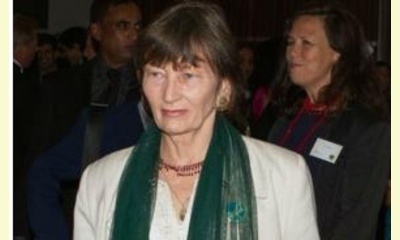|
|
Meet Auckland’s Peace Diplomat [New Zealand]
un article par I am Woman, Indian Weekender (reprinted by permission)
In our pursuit of global empowerment - I am Woman was a proud
supporter of the Auckland Peace City Celebration of Nuclear Free
New Zealand along with the United Nations on the 27th September
2014. This was the first anniversary of the United Nations
International Day for the total elimination of nuclear weapons. The
driving force behind this event was Auckland City’s Peace diplomat
– Ms Laurie Ross. She is also a member of the board of advisors at I
am Woman. We caught up with Laurie to share with us her journey
and contribution to ensuring that New Zealand remains a Nuclear
free zone. Here is the interview with Laurie Ross - 
Auckland City’s Peace diplomat- Ms Laurie Ross
click on photo to enlarge
IAW : What is the role of women in World Peace?
Laurie: Mahatma Gandhi said “Nonviolence is not merely a personal
virtue. It is also a social virtue to be cultivated like other
virtues.”This century is being called the century of women, as such
women have a pivotal role to play in the peace process. Women are
the mothers who nurture the children and teach them values and
behaviours for peace within the family and community. Women
must awaken to their inherent power and leadership role in the
work for world peace. As women become educated they question
the prevailing narratives that maintain the culture of warfare with
the huge civilian suffering it entails. Women are growing in
knowledge, strength and courage to oppose this global cultural
indoctrination that perpetuates war and killing. Women can and
must become empowered leaders for peace work on all levels of our
society and in all spheres of activity.
IAW : Please tell us about your journey?
Laurie : My father Larry Ross brought the family to New Zealand in
1962 from Montreal Canada with the idea that he could work more
effectively for peace, nuclear disarmament and survive a limited
nuclear war in the Northern hemisphere. (I was the eldest of 6
children). He first established the Bertrand Russell Peace Foundation
in 1964 during my student years at home so I was very aware of the
threat of nuclear war and how it could destroy all life on earth. I
also learned from my father how to work effectively to help people
become informed, courageous and exercise their political freedom
to transform apathy, anger and despair into positive action.
In 1982-87- I was Coordinator of the West Auckland Peace Group
and worked intensively organising public information stalls,
marches and rallies, lobbying politicians, education events etc.
Meanwhile, I was also a fulltime wife and mother (2 daughters)
earning a living as a sales/marketing representative with various
companies. (Now I am a fulltime grandmother of four
children)Throughout my life I have always been a practitioner of
Buddhist philosophy and studied many other religions and spiritual
paths. I am a member of SGINZ since 2008 and am impressed with
their work to promote peace, culture and education across the
world.
(This article is continued in the discussionboard)
|








|
DISCUSSION
Il n'y pas encore de question liée à cet article.
* * * * *
Commentaire le plus récent:
(The following is continued from the main article listed above.)
Although I work on various social and environmental issues and support many campaigns for human rights and non-violence etc, I have recognised the importance and value of my role to maintain a consistent focus on achieving the goal of elimination of nuclear weapons.
Since 2010 I have worked mainly through the Peace Foundation and UNANZ to establish the Auckland City for Peace Declaration and manifestation of this in a variety of Peace City
Projects.Most recently I worked with Whau and Waitakere Ranges Local Boards to produce a Peace City Celebration of Nuclear Free New Zealand. This was also the first UN International Day for the Total Elimination of Nuclear Weapons. I am glad that I am Woman and the Indian Weekender were a part of this event.We also asked Laurie about New Zealand’s history in becoming Nuclear Free and how we common people can contribute to world peace.
IAW: What is the history behind New Zealand being nuclear free?
Laurie: In 1958 the Campaign for Nuclear Disarmament (CND) was established in Britain with branches throughout the world including New Zealand. British, American and French nuclear testing was done in the South Pacific (1950s-1990s) which caused great concern to New Zealanders who were motivated to stop this radioactive contamination activity of the atmosphere, water and land that endangered the health of people in the Pacific.
In 1973, the NZ government under Norman Kirk sent a brigade to protest against French nuclear tests at MururoaAtoll as did the Greenpeace ships creating significant international attention. Between 1975-’84, the NZ Peace Squadron was formed of private sailing vessels to protest against the visits of American nuclear warships and submarines to NZ harbours.In 1976, the Campaign Half Million petition stopped the NZ government from investment in nuclear energy schemes.
Between 1981-2007, the New Zealand Nuclear Free Zone Committee was established by Larry Ross of Christchurch. (Later known as NZ Nuclear Free Peacemaking Association). He presented a carefully structured strategic plan for achieving this goal which was adopted at the annual New Zealand Peace Conference. It was based on the1978 United Nations Resolutions on the importance and value of individual states or groups of nations declaring themselves Nuclear Free Zones and thus contributing to nuclear disarmament in the international community.
In 1982 the Peace Movement grew at a phenomenal rate through neighbourhood peace groups forming in every town throughout the land who proceeded with public education, petitions and promotion for a Nuclear Free NZ and lobbying their local councils. . ... continuation.

|
|









